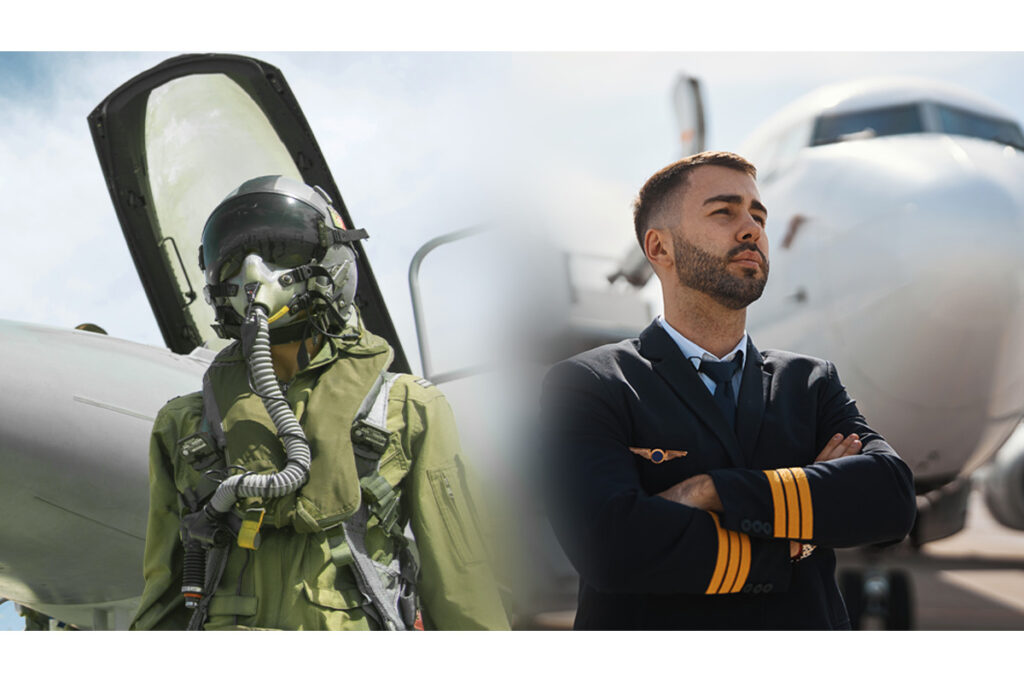

Quick Summary
The aviation sector in India has grown quickly over the last twenty years. This growth offers new pilots exciting and rewarding career options. Major airlines are expanding their operations. The demand for air travel is increasing quickly. The aviation industry is seeing a rise in commercial and military opportunities. If you want to know how to become a pilot in India, you are in the right place. This career can take you to new heights in the sky and life!
In India, becoming a pilot involves several straightforward steps. If you want to fly commercial planes or serve as a military pilot, the country has clear paths to help you reach your goals. This guide will help you learn how to become a pilot in India. It covers the qualifications you need, the training programs available, entrance exams, and the job opportunities waiting for you.
Aspiring pilots in India usually pick between two main career paths. They can choose between two options. One is civil aviation for commercial pilots. The other is military aviation with the Indian Air Force (IAF). However, they have very different eligibility requirements for admission, training regimens, and career prospects. If you are wondering how to become a pilot in India, understanding these pathways will help you make an informed decision.
Becoming a commercial pilot is the most common route to fly commercial aircraft for airlines or charter services. Commercial pilots operate large passenger aircraft to ensure safe and smooth transportation. Here’s how you can become a commercial pilot in India:
DGCA is the Directorate General of Civil Aviation, India’s regulatory body overseeing civil aviation. You must enroll in a flying school that DGCA approves to gain recognition for your pilot training. These schools issue theoretical and practical training courses to acquire the necessary skills and knowledge. Some of the prominent DGCA-approved flying schools in India are:
Your pilot training will include ground schooling (theoretical classes) and practical flight training. In the theoretical courses, you will learn about different topics. These include aircraft systems, air navigation, meteorology, aviation laws, and flight planning. How to Become a Pilot in India also involves completing practical flight training to help you build your flying hours.
For example, a CPL is obtained at 200 flight hours minimum. The actual flight hour minimums will depend on your selected course of study. By reaching that milestone, you will learn to fly in different weather. You will also manage aircraft systems and handle emergencies.

You must achieve your Commercial Pilot License (CPL) after training. To get the CPL, one must clear the DGCA exams and be eligible medically.
A key part of a career in commercial flying in India is meeting the medical standards set by the DGCA. A Class 1 Medical Examination is mandatory and tests your mental and physical fitness.

If you love your country and want to serve, becoming a military pilot in the Indian Air Force (IAF) could be a great choice. Military pilots fly fighter jets and transport aircraft and helicopters. They are the primary force behind national defense and participate in combat and peacekeeping missions. If you are interested in how to become a pilot in India in the military, here is a step-by-step guide:
To join the Indian Air Force as a pilot, you need to clear one of the following exams:
Once you clear the entrance exams, you must join the Air Force Academy (AFA) or other IAF training establishments. How to Become a Pilot in India involves rigorous training, including tests of physical fitness and aviation training. This will prepare you for a job in the armed forces.
As a military pilot, you’ll serve at least 10-15 years, depending on the IAF’s requirements. This service period is significant because you will be involved in national defense and other specialized missions. The IAF sponsors your training, covering the financial costs associated with your education.
| Criteria | Civil Aviation (Commercial Pilot) | Indian Air Force (Military Pilot) |
| Training Location | DGCA-approved flying schools | NDA, AFA, IAF Training Academies |
| License Required | Commercial Pilot License (CPL) | Military Pilot Certification |
| Cost of Training | ₹50 Lakhs – ₹1.2 Crores | Sponsored by the Government |
| Career Commitment | Flexible career choices | Minimum 10-15 years of service |
| Salary | ₹1-15 Lakhs per month | ₹80,000 – ₹2.5 Lakhs per month |
The process is relatively straightforward if you pursue a pilot career after completing 12th grade. If you’re wondering how to become a pilot in India after 12th, here’s a step-by-step guide to help you:
Also Read:

As an aspiring pilot, you will need to clear specific entrance exams depending on the training route you choose:
Also Read: Defence Exam
Pilot training is an expensive investment. If you are wondering how to become a pilot in India, the cost of training may range from ₹50 Lakhs to ₹1.2 Crores, depending upon the flying school and course duration. However, many financial institutions offer bank loans, and some flying schools provide scholarships, which may reduce the financial burden for aspiring pilots.
As part of your training on how to become a pilot in India, you will need to obtain several pilot licenses, including:
Salary expectations are among the most frequently asked questions regarding how to become a pilot in India. Pilot salary in India vary based on experience, airline, and aircraft type. Understanding salary structures is essential for those wondering how to become a commercial pilot in India.
A fresh commercial pilot with a CPL and type rating can expect an average monthly starting salary of ₹1-3 lakh. Yet, this can vary depending on the airline and additional flying experience.
With 3-5 years of experience, first officers and captains can earn anywhere between ₹5-10 lakh per month. Senior captains flying for major airlines like Air India, IndiGo, and Vistara can command salaries of ₹12-15 lakh per month.
For those pursuing a military aviation career through the Indian Air Force, entry-level salaries start at ₹80,000 per month, with experienced fighter pilots earning up to ₹2.5 lakh per month and additional benefits like housing, medical care, and pension.
Private and charter pilots earn between ₹3 and 7 lakh per month, depending on the aircraft type and employer. Cargo pilots also earn competitive salaries, with leading logistics companies offering ₹6-12 lakh per month.
The demand for pilots in India is vast, and with the right qualifications, you can build a successful career flying for a commercial airline, operating private aircraft, or transporting cargo. If you are wondering how to become a pilot in India, obtaining the proper training and certifications is essential. With the growing aviation industry, your CPL opens up numerous career opportunities in both domestic and international aviation sectors.
Whether you aim to be a civil aviation pilot or an air force pilot, these tips will help you succeed:
Becoming a pilot in India is a dream come true for many and presents an exciting, rewarding career. Whether you wish to fly commercial airliners or serve your country in the military, there is much to choose from. But if you ever wonder how to become a pilot in India, it involves a lot of hard work, commitment, and financial planning. So, if you are passionate about aviation, start your journey today and get ready to fly high! If you take the proper steps, you will be on your way to how to become a pilot in India.
Also Read: Aeronautical Engineering
The cost of becoming a pilot in India varies based on the flying school and training program. A course at one of the institutes approved by DGCA can cost between ₹50 lakh and ₹1.2 crore. This includes flight training, ground school fees, and licensing fees. Scholarships and bank loans are provided to finance aspiring pilots’ education towards realizing their dream of flying.
The salary of a pilot in India depends on experience and the airline. Entry-level commercial pilots earn ₹1-3 lakh per month, while experienced captains can make ₹10-15 lakh monthly. Military pilots earn ₹80,000 to ₹2.5 lakh monthly. Those wondering how to become a pilot in India should know that salaries are lucrative and increase with experience and additional certifications.
Yes, the qualification for a pilot includes passing 10+2 in physics and mathematics. However, specific percentage requirements vary by flying school. Students who have not studied these subjects can take equivalent exams via NIOS. Marks are not the only criteria; clearing the pilot entrance exam and medical tests is crucial for admission to a pilot course.
The pilot entrance exam can be challenging, as it tests subjects like physics, mathematics, English, and aviation aptitude. Candidates can clear exams like PILOT CET, IGRUA Entrance Exam, or AME CET with proper preparation. Military aspirants must also pass NDA, CDSE, or AFCAT, followed by SSB interviews and medical evaluations.
Becoming a pilot is a gratifying career with excellent pay and global opportunities. If you’re wondering how to become a pilot in India, know that the aviation industry is growing rapidly, and there is an increasing demand for skilled pilots. While the training is costly, the profession offers job security, travel benefits, and a fulfilling commercial or military aviation career path.

Authored by, Amay Mathur | Senior Editor




Amay Mathur is a business news reporter at Chegg.com. He previously worked for PCMag, Business Insider, The Messenger, and ZDNET as a reporter and copyeditor. His areas of coverage encompass tech, business, strategy, finance, and even space. He is a Columbia University graduate.
Editor's Recommendations
Chegg India does not ask for money to offer any opportunity with the company. We request you to be vigilant before sharing your personal and financial information with any third party. Beware of fraudulent activities claiming affiliation with our company and promising monetary rewards or benefits. Chegg India shall not be responsible for any losses resulting from such activities.
Chegg India does not ask for money to offer any opportunity with the company. We request you to be vigilant before sharing your personal and financial information with any third party. Beware of fraudulent activities claiming affiliation with our company and promising monetary rewards or benefits. Chegg India shall not be responsible for any losses resulting from such activities.